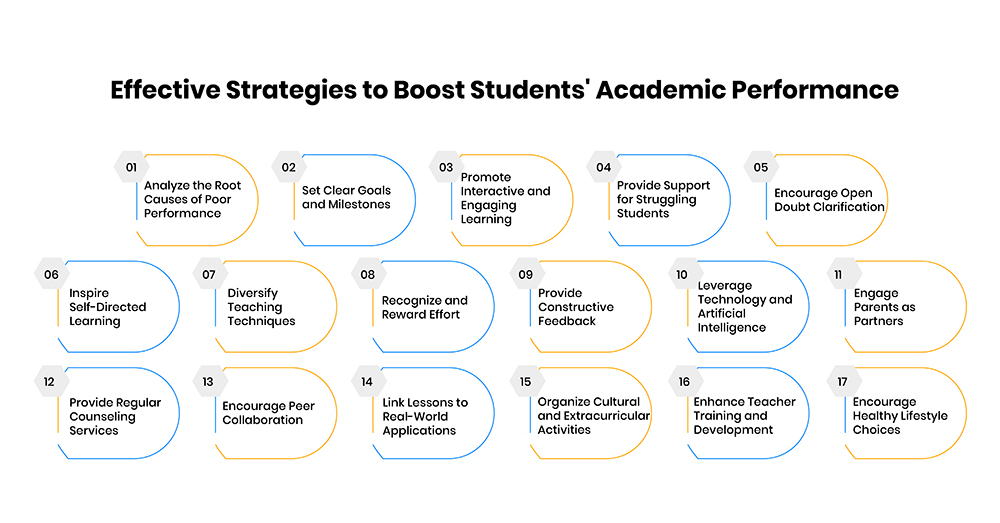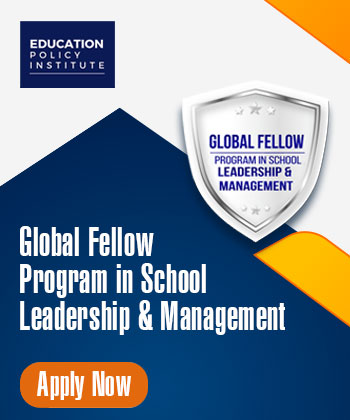Enhancing Learning Outcomes: Strategies for Achieving Academic Excellence in Students
January 13, 2025Every student in a classroom has unique strengths, challenges, and learning abilities. While some excel across academics, sports, and extracurriculars, others may struggle to meet academic expectations. These challenges can hinder their ability to grasp new concepts, engage in classroom activities, or perform well in exams, potentially affecting their progression to higher grades. For educators, developing improvement in such students requires additional focus and better strategies to address their individual needs effectively.
Creating a positive school environment plays a pivotal role in enhancing academic performance. By ensuring inclusivity, promoting positive behaviors, and igniting students’ interests, teachers can cultivate a supportive atmosphere that encourages growth. Small yet impactful changes, such as engaging teaching methods, individualized attention, and creating a sense of belonging, can significantly boost learning outcomes. Parents, teachers, and administrators must collaborate to overcome barriers and unlock each student’s potential, ensuring they acquire the critical skills and knowledge needed to thrive in education and beyond.
The Role of Academic Standards in Enhancing Student Success
Academic achievement is a cornerstone of student success, equipping learners with the skills, knowledge, and tools necessary to achieve their personal and professional goals. While often assessed through standardized testing, true academic success goes beyond comparisons with peers. It includes personal growth, self-set goals, and continuous improvement. Achievements such as college admission or acquiring specific competencies can serve as milestones for students aiming to align their education with career aspirations. Academic standards, established by individual states or regions, play a critical role in promoting educational equity by ensuring all students are held to consistent benchmarks.
These standards provide a structured framework for instructional planning and assessment, enabling educators to design effective curricula while allowing room for personalized learning. With clear lesson structures, teachers can focus on addressing individual needs without deviating from the overall plan. Additionally, objective, standards-based assessments help identify learning gaps early, ensuring timely interventions that prevent students from falling behind. By combining high expectations with culturally responsive teaching and supplementary programs, educators can mitigate biases, enhance equity, and drive better academic outcomes, ultimately shaping well-rounded individuals prepared to tackle future challenges.
Comprehensive Strategies to Boost Students' Academic Performance
Improving academic performance is a multifaceted endeavor that requires understanding individual needs, encouraging engagement, and utilizing innovative methods. Below are a few strategies derived from multiple perspectives to address this crucial goal comprehensively:

-
Analyze the Root Causes of Poor Performance
Understanding the underlying reasons for students’ weak performance is critical. Factors such as stress, lack of interest, a disruptive home environment, or transitioning curricula may impact learning. Teachers can track past performance, identify strengths and weaknesses, and create customized strategies to address specific challenges. Exploring various teaching methods, such as visual aids or interactive discussions, can also help cater to diverse learning needs. -
Set Clear Goals and Milestones
Helping students establish achievable objectives and regularly reviewing their progress builds accountability. Clear milestones guide their efforts, making learning structured and purposeful. -
Promote Interactive and Engaging Learning
Interactive classrooms help maintain interest and improve understanding. Teachers can introduce activities like brain games, group discussions, and practical demonstrations to simplify complex topics. Incorporating audio-visual materials and documentaries also makes learning more dynamic, appealing to different learning styles. -
Provide Support for Struggling Students
Special classes or individualized tutoring can reinforce foundational concepts and offer one-on-one support. These sessions give students the space to learn at their own pace, ask questions freely, and address specific academic challenges without fear of judgment. -
Encourage Open Doubt Clarification
Creating anonymous doubt sessions allows students to ask questions discreetly, reducing fear of embarrassment. This approach encourages open communication and helps educators address gaps effectively. -
Inspire Self-Directed Learning
Encouraging students to explore topics independently cultivates critical thinking and confidence. Assigning creative tasks like presentations or research projects can motivate them to engage deeply with the material, making classroom lessons more impactful. -
Diversify Teaching Techniques
A single teaching style may not resonate with all students. Incorporating real-world examples, group projects, field trips, and industry visits provides practical insights and keeps learning exciting. Activities like storytelling, role-playing, and case studies make concepts relatable and memorable. -
Recognize and Reward Effort
Acknowledging students’ efforts rather than focusing solely on results builds motivation. Teachers and parents can celebrate progress, offering constructive reinforcement to inspire consistent improvement. -
Provide Constructive Feedback
Detailed feedback personalized to individual students helps them identify areas for improvement. Positive and actionable suggestions encourage a growth mindset, enabling students to work effectively on their weaknesses while leveraging their strengths. -
Leverage Technology and Artificial Intelligence
Modern technologies can revolutionize learning. AI-powered tools can track progress, analyze performance, and provide personalized resources. Virtual simulations, online quizzes, and digital collaboration platforms make learning accessible and engaging. Automation of routine tasks like grading allows teachers to focus on personalized instruction. -
Engage Parents as Partners
Parents play a vital role in academic success. Schools can regularly communicate with them, discuss students’ routines and challenges, and suggest ways to create a supportive home environment. Collaborative efforts between parents and teachers significantly enhance students’ performance. -
Provide Regular Counseling Services
Offering access to counseling helps students manage stress, develop coping strategies, and address personal issues that may affect their academic performance. Regular check-ins with counselors can support students' emotional well-being and academic success, creating a healthy and productive mindset. -
Encourage Peer Collaboration
Peer-to-peer learning through study groups and collaborative projects enables students to learn from each other’s strengths and perspectives. Such interactions build teamwork skills and create a supportive learning community. -
Link Lessons to Real-World Applications
Connecting academic topics with real-life scenarios through projects, case studies, or industry collaborations enhances relevance and engagement. Students are more likely to grasp concepts when they see their practical utility. -
Organize Cultural and Extracurricular Activities
Participating in cultural events and extracurricular activities can enhance students' social skills, creativity, and overall engagement with the school community. These activities provide a well-rounded educational experience and can positively influence academic performance. -
Enhance Teacher Training and Development
Investing in continuous professional development for teachers ensures they are equipped with effective teaching strategies and up-to-date knowledge. Well-trained educators can better address diverse learning needs and improve student outcomes. -
Encourage Healthy Lifestyle Choices
Promoting physical activity, balanced nutrition, and adequate sleep contributes to better cognitive function and overall well-being, positively impacting academic performance. A healthy lifestyle supports concentration and memory retention.
Tracking Progress and Adapting Strategies for Maximum Impact
Effectively tracking student progress is essential for educators to understand each learner's strengths and areas needing improvement. Implementing a robust system allows teachers to identify when to adjust the pace of instruction, revisit concepts, or introduce new material. Regular assessments, such as quizzes, exit tickets, and observational notes, provide valuable insights into student comprehension and engagement. By consistently monitoring these indicators, educators can make informed decisions to enhance the learning experience.
Adapting teaching strategies based on the data collected from progress tracking ensures that instruction remains responsive to students' evolving needs. For instance, if assessments reveal that a significant portion of the class struggles with a particular concept, the teacher can modify the lesson plan to include additional practice or alternative explanations. This dynamic approach facilitates a more personalized learning environment, where teaching methods are continually refined to maximize student success.
Conclusion
Enhancing academic performance in students requires a multifaceted approach that goes beyond just teaching content. It involves creating a supportive environment that nurtures each student's individual needs, promoting active engagement, and encouraging self-driven learning. By utilizing diverse teaching methods, leveraging technology, and cultivating strong communication between educators, parents, and students, schools can help students overcome challenges and unlock their full potential. Regular tracking and adapting strategies further ensure that teaching methods are effectively aligned with students' progress, leading to continuous improvement. With a commitment to these comprehensive strategies, educators can cultivate a thriving academic atmosphere that not only boosts performance but also supports personal growth and prepares students for future success.





